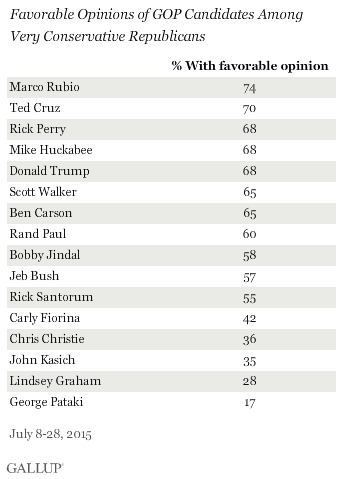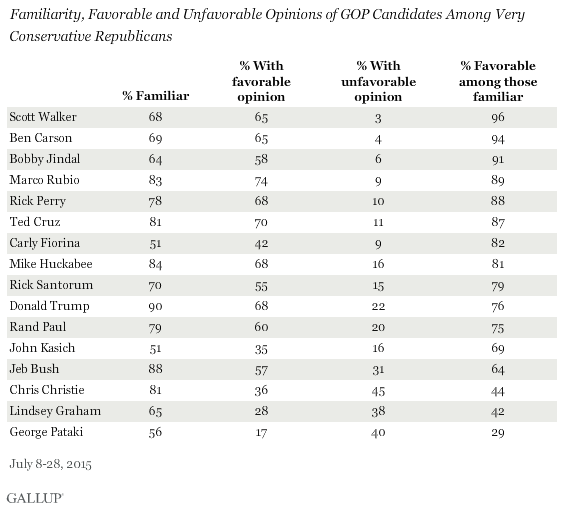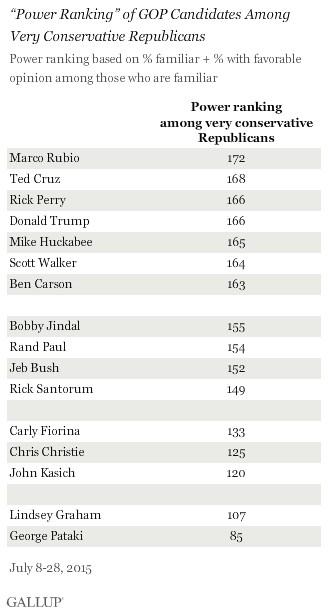The field of Republican candidates is remarkably large this year. My colleague Justin McCarthy has done some research showing that the Republicans last had 17 candidates in 1916, a number that with the addition of former Virginia Gov. Jim Gilmore Thursday, is now matched by the current GOP field. More recently, there were 13 Republican candidates running in 2000, certainly a crowd, but not the type of crowd we are seeing for the 2016 election.
The hugely crowded nature of the GOP field, among other things, leads the candidates to a singular focus on attempting to stand out from the crowd. One major focus is the effort to win the hearts and minds of GOP voters in the early primary and caucus states of New Hampshire and Iowa. Another focus has been the effort to target strongly conservative Republican voters, under the assumption that these voters are highly motivated and involved in the political process, and therefore are most likely to turn out and vote in the primaries. As an example, Texas Sen. Ted Cruz's actions in the U.S. Senate in recent days have been widely interpreted as an effort to play to the conservative base of the party, which he hopes will help bolster his presidential bid with monetary contributions as well as votes.
We've been tracking the recognition and images of 16 Republican presidential candidates since July 8, and each candidate has been rated by about 1,600 Republican and Republican-leaning independents during that time period. We ask our sample each night to describe their ideology on a five-point scale, from very conservative to very liberal. The majority -- 62% -- of Republicans describe themselves as conservative, with most of the rest describing themselves as moderate. A relatively small group of Republicans, 15%, say that they are very conservative. It is this hard-core group of very right-leaning Republicans that I will focus on in this analysis.
One way to look at the data is the straight rank order of the candidates based on the percent of very conservative Republicans who have a favorable opinion of each. The average favorable rating of the 16 candidates among this group is 54%, with ratings ranging from 74% for Florida Sen. Marco Rubio at the top, to 17% for former New York Gov. George Pataki at the bottom.

Seven candidates have favorable ratings of about two-thirds or more among conservative Republicans, including Rubio, Cruz, Rick Perry, Mike Huckabee, Donald Trump, Scott Walker and Ben Carson. At the other end of the spectrum, the losers among conservative Republicans are Pataki, Lindsey Graham, John Kasich, Chris Christie and Carly Fiorina, each with a favorable rating of less than 50%.
These basic favorable ratings reflect both name identification and sentiment. Fiorina and Kasich, for example, are only familiar to 51% of very conservative Republicans, meaning that their favorable rating would max out at 51% if every one of those Republicans said they had a favorable opinion of them. On the other hand, Trump is familiar to 90% of very conservative Republicans and Jeb Bush to 88%, meaning that if just six in 10 had a favorable opinion of either, that favorable rating would be above the theoretical maximum that Fiorina and Kasich are capable of achieving. As another example, Christie and Kasich get about the same favorable rating among very conservative Republicans, yet Christie is familiar to 81% and Kasich to 51%, meaning that Kasich is, in reality, getting a higher favorable rating among those who know him than is Christie.
We can remedy that situation by calculating the favorable ratings only among those very conservative Republicans who know the individual (based on those who give either a favorable or unfavorable opinion). This levels the playing field and gives us an indication of how well the candidates are doing among Republicans who know each one. This isn't a perfect procedure. A candidate who is not well-known may, by definition, be attracting only a niche cadre of very loyal supporters, and it may be that, as candidates get better known, they are essentially going to become known by more people who have unfavorable opinions. Nevertheless, the process is illustrative -- particularly when looking at relatively well-known candidates. This calculation is presented in the right-hand column of the table below.

Here we find a group of three candidates with a remarkable 90% or higher favorable rating among very conservative Republicans who know them -- Scott Walker with 96% favorable among those who know him, Ben Carson with 94%, and Bobby Jindal with 91%. Just below this group in the 80% range are Rubio, Perry, Cruz, Fiorina and Mike Huckabee.
A candidate with a clear deficit position among very conservative Republicans is Christie, who is well-known but gets a 44% favorable rating among those familiar with him. This means that more than half of the very conservative Republicans who are familiar with Christie give him an unfavorable rating. Only Graham and Pataki do worse.
I calculated a crude "power ranking" among very conservative Republicans, which is based on the simple procedure of adding together each candidate's familiarity rating and their favorable rating among those who are familiar with them. This process thus takes into account name identification, a very important element in any political contest, and also what we could call "brand power," or the ability of a candidate to generate positive impressions among those who know them well enough to have an opinion. So, for example, the current power rankings of Bush and Perry are determined by how well-known each is and also how valuable their brands are within those who know them. Bush scores lower than Perry because the former is not leveraging his high name identification with a high brand value.
Following this method, seven candidates can be placed in a top tier among very conservative Republicans -- Rubio, Cruz, Perry, Trump, Huckabee, Walker and Carson. The second tier group consists of Jindal, Paul, Bush and Santorum. In a third group are Fiorina, Christie and Kasich. And, at the bottom, are Graham and Pataki.

All of these calculations are based on the fairly small sample of very conservative Republicans whom we have interviewed so far over the past three weeks, so small differences among candidates don't mean much. We'll keep monitoring these images going forward, particularly after next Thursday's inaugural debate in Cleveland, Ohio. We'll also be looking at how well the candidates play among the smaller group of Republicans who label themselves ideologically as moderate or liberal.
